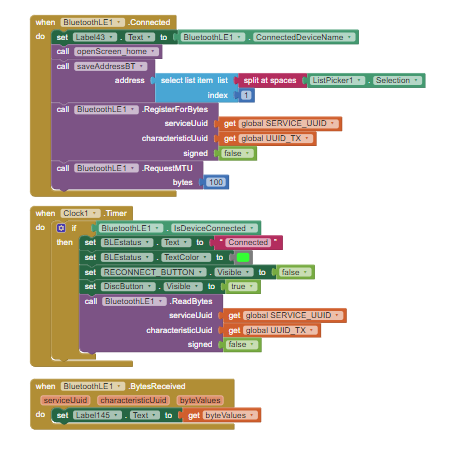Hi everyone,
I am trying to make a simple app on MIT App Inventor to be able to display multiple values sent from ESP32 on my android phone.
I use BLE on ESP32 to send the values (GPS data) to the phone.
The number of variable I would like to see on phone screen is pretty much, so instead of creating bunch of characteristics on BLE, I am sending a binary message I created with a binary structure in a single BLE characteristics. It includes different data types such as uint8 and float.
However, I struggle with finding the right way to create the blocks for parsing the binary message. I have seen in other topics that using built-in Lists and RegisterForFloats procedure for repeated only float values (up to 4) is an option, but I don't know if parsing such binary structure is even possible on App Inventor. At the end I would like to display around 20 different variables on my phone screen.
Here is a sample Arduino code I have to send the data from ESP32:
#include "HardwareSerial.h"
#include <BLEServer.h>
#include <BLEDevice.h>
#include <BLEUtils.h>
#include <BLE2902.h>
// BLE UUIDs
#define SERVICE_UUID "adc78270-9394-4fc6-9018-f3bb18a1d3e8" // UART service UUID
#define CHARACTERISTIC_UUID_RX "adc78271-9394-4fc6-9018-f3bb18a1d3e8" // WRITE
#define CHARACTERISTIC_UUID_TX "adc78272-9394-4fc6-9018-f3bb18a1d3e8" // READ
// BLE SETUP
BLEServer* pServer = NULL;
BLECharacteristic* pCharacteristic;
bool deviceConnected = false;
bool oldDeviceConnected = false;
uint8_t binaryMessage[100]; // Define the binary message buffer
uint8_t modeId = 1;
float currentTime = 0;
float groundSpeed = 0;
float latitude = 0;
float longitude = 0;
class ServerCallbacks : public BLEServerCallbacks {
void onConnect(BLEServer* pServer, esp_ble_gatts_cb_param_t* param) {
deviceConnected = true;
pServer->updateConnParams(param->connect.remote_bda, 0, 0x20, 0x10, 2000);
};
void onDisconnect(BLEServer* pServer) {
deviceConnected = false;
}
};
class MyCallbacks : public BLECharacteristicCallbacks {
void onWrite(BLECharacteristic* pCharacteristic) {
String rxCommand = pCharacteristic->getValue().c_str();
if (!rxCommand.isEmpty()) {
if (rxCommand.startsWith("#")) {
try {
// Attempt to print the command (excluding the '#' character)
Serial.print("Received cmd: ");
Serial.println(rxCommand.substring(1));
} catch (...) {
// If an exception occurs during command processing
Serial.println("Command failed. ");
}
}
}
}
};
float generateRandomFloat(float minVal, float maxVal) {
// Initialize the random number generator with a random seed
randomSeed(analogRead(0)); // You can use any analog pin for randomSeed()
// Generate a random integer within the desired range
int randInt = random(RAND_MAX);
// Map the random integer to a float within the specified range
float randFloat = map(randInt, 0, RAND_MAX, minVal, maxVal);
return randFloat;
}
void BLEconfig() {
// Set unique BLE name based on ESP32 chip ID
String BLEname = "ESP32";
// Create the BLE Device
BLEDevice::init(BLEname.c_str());
// Create the BLE Server
BLEServer* pServer = BLEDevice::createServer();
pServer->setCallbacks(new ServerCallbacks());
// Create the BLE Service
BLEService* pService = pServer->createService(SERVICE_UUID);
// Create a BLE Characteristic
pCharacteristic = pService->createCharacteristic(
CHARACTERISTIC_UUID_TX,
BLECharacteristic::PROPERTY_READ | BLECharacteristic::PROPERTY_NOTIFY);
// Create a BLE Descriptor to Notify
pCharacteristic->addDescriptor(new BLE2902());
// Create a BLE Characteristic for Commands RX
BLECharacteristic* pCharacteristic = pService->createCharacteristic(
CHARACTERISTIC_UUID_RX,
BLECharacteristic::PROPERTY_WRITE);
pCharacteristic->setCallbacks(new MyCallbacks());
// Start the service
pService->start();
// Start advertising
BLEAdvertising* pAdvertising = BLEDevice::getAdvertising();
pAdvertising->setScanResponse(false);
pAdvertising->setMinPreferred(0x0); // set value to 0x00 to not advertise this parameter
BLEDevice::startAdvertising();
}
void setup() {
// Open serial communications
Serial.begin(921600);
BLEconfig();
}
void LogBinary() {
// Calculate the total size of the binary message
size_t messageSize = 4 * sizeof(float) + sizeof(uint8_t);
// Create a buffer to hold the binary message
uint8_t binaryMessage[messageSize];
// Index to iterate through the binary message
size_t index = 0;
// Copy fixed-size data types
memcpy(&binaryMessage[index], &modeId, sizeof(uint8_t));
index += sizeof(uint8_t);
memcpy(&binaryMessage[index], ¤tTime, sizeof(float));
index += sizeof(float);
memcpy(&binaryMessage[index], &groundSpeed, sizeof(float));
index += sizeof(float);
memcpy(&binaryMessage[index], &latitude, sizeof(float));
index += sizeof(float);
memcpy(&binaryMessage[index], &longitude, sizeof(float));
index += sizeof(float);
}
void loop() {
// Disconnecting
if (!deviceConnected && oldDeviceConnected) {
delay(500); // give the bluetooth stack the chance to get things ready
pServer->startAdvertising(); // restart advertising
Serial.println("BLE reconnected.");
oldDeviceConnected = deviceConnected;
}
// connecting
if (deviceConnected && !oldDeviceConnected) {
oldDeviceConnected = deviceConnected;
}
// Generate a random float
currentTime = generateRandomFloat(0.0, 86400.0);
groundSpeed = generateRandomFloat(0.0, 400.0);
latitude = generateRandomFloat(-90.0, 90.0);
longitude = generateRandomFloat(-180.0, 180.0);
// Generate the log
LogBinary();
// SEND Data Message via BLE
pCharacteristic->setValue(const_cast<uint8_t*>(binaryMessage), sizeof(binaryMessage));
pCharacteristic->notify(); // Send the value to the app!
}
Any help is appreciated!
